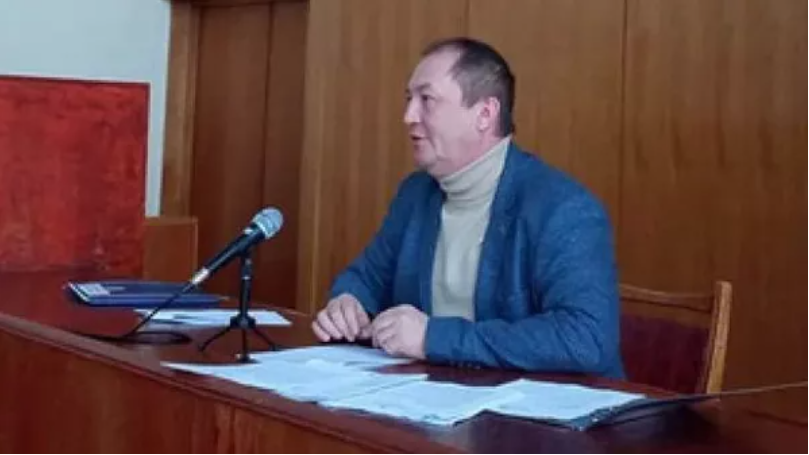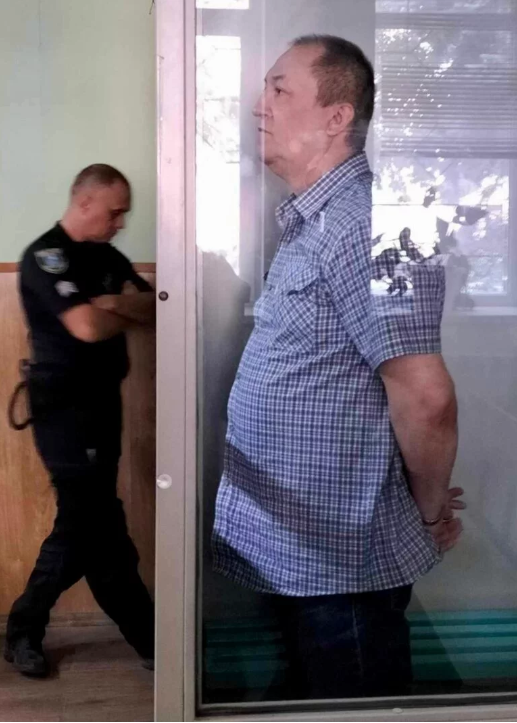On April 29, 2022, in the town of Seredino-Buda, Shostka Raion, Sumy Oblast, the Security Service of Ukraine (SBU) detained the head of the local territorial community, Alexander Gen, charging him under Part 2 of Article 332 (illegal movement of citizens across the border) and Part 2 of Article 111 of the Criminal Code of Ukraine (treason).
Gen was elected in 2020 from the opposition party “Nash Krai.” The prosecution alleges that during the Russian occupation of Sumy Oblast, from late February to April 2022, he defected to Russia and organized the illegal transfer of people across the state border, essentially helping civilians escape the combat zone. Their only escape route was towards Russia.
The charges mention Gen having “dubious connections” (which is not a legal term) with Russian representatives, but specify neither who these representatives are, the nature of the connections, whether they constitute treason, whether they were intended to harm Ukraine, or how this alleged harm manifested. The charges also don’t state whether Gen received instructions from any Russian representatives to facilitate border crossings. The protocols of covert investigative actions (CIA) contain no mention of Gen agreeing to defect to Russia or receiving funds from Russia to support the community. There’s no information about Gen providing Russian forces with data on the deployment and movement of Ukrainian Armed Forces (UAF) units. In fact, the case materials suggest that UAF units were never sighted in the Seredino-Buda area. The protocols also fail to corroborate the charges concerning Gen’s alleged participation in the blockade of a Ukrainian border guard base, which was abandoned on February 24, 2022, and remained unoccupied until Russian forces withdrew from the region.
Therefore, the SBU and the prosecutor’s office charged Alexander Gen, with a potential life sentence and confiscation of assets, for allegedly assisting in the evacuation of people from the combat zone.

Nothing else is corroborated by the case materials or witness testimonies.
One of the witnesses, a serviceman named Volodymyr, claimed that Ukrainian border guards in Sumy Oblast fled, abandoned the checkpoint, and people—both Russians and locals—were freely crossing the border back and forth. When Volodymyr reported this to the police, they replied, “Not our problem, we were told not to interfere.” The witness believes that the border guards and police were inactive on orders from Hen, but admits he heard this from others and cannot confirm it himself. In any case, the head of the territorial community had no authority to give orders to border guards (subordinate to the State Border Guard Service) or police (subordinate to the Ministry of Internal Affairs). Here, the accusation appears to be an attempt to shift blame from law enforcement to someone who had neither the authority nor the ability to change anything.Volodymyr’s sister, also a servicemember, was questioned as well.
“I arrived in Seredyna-Buda from Shostka about two weeks later and saw for myself that our checkpoint was open, with sabotage groups moving freely. Rosgvardia [Russian National Guard] was also operating there,” the woman testified.
This means she only reached the town two weeks after the alleged order from Oleksandr Hen, was not a direct witness to the border guards abandoning their post, and thus could not know the exact circumstances. It’s also unclear how she identified the people crossing the empty checkpoint as “sabotage groups” or how she, as a Ukrainian Armed Forces servicemember, could freely observe such movements. Moreover, if Rosgvardia was already active in the area, Ukrainian forces no longer controlled it—so even if Hena had forbidden (or allowed) border crossings, it’s unlikely anyone would have listened.
In court, Viktor Hubenko, head of the Shostka District Administration, testified. He stated he knew nothing about Hen collaborating with Russians but confirmed that on February 25–26, Hen reported Russian forces had arrived at the checkpoint, moved concrete barriers aside, and announced buses would be provided for locals to travel freely to Russia for food and medicine.
“Hen said the aggressor would not stop people if they wanted to go there,” Hubenko clarified.
This implies two things:
- Russians permitted locals (voluntarily) to enter Russian territory to avert a humanitarian crisis in Seredyna-Buda, where all services had collapsed.
- Even if Hen had approved this, it would not constitute a crime under international law. But no one asked Hen — people were simply told they could go.

Oksana Tarasiuk testified that Oleksandr Hen had communicated with the head of the administration in Suzemka (a Russian border town), who assured him that residents of Seredyna-Buda would be allowed to purchase essential goods in Suzemka without obstruction. Thus, while formally remaining the head of the community, Hen fulfilled his duty to the people—at the very least, by clarifying what awaited them if they crossed for food or medicine. Even humanitarian coordination would not constitute a crime, but here there was no “cooperation”—merely a phone call to ascertain the situation.
Hen was held in pre-trial detention (SIZO) for seven months during the investigation. The case only reached court in November 2022. Notably, 18 out of 21 deputies of the Seredyna-Buda City Council signed a positive character reference for Hen.
On 1 May 2023, the Zarechny District Court in Sumy released him on bail of 1.5 million UAH (~$50,000).
“The allegation of treason by this official remains unproven and must be demonstrated through judicial process,” stated the court’s press service.
The principle of “innocent until proven guilty” was blatantly violated by media, bloggers, and even investigators who branded Hen a criminal before trial. This was further exacerbated when Dmytro Zhyvytskyi (then head of the Sumy Regional Military Administration) and local far-right activists publicly threatened Judge Oleksiy Sybylev for granting bail. Intimidated, the court reversed its decision and remanded Hen back into custody.
Hen admitted urging local “hotheads” preparing Molotov cocktails (to throw at Russian troops) not to escalate violence: when the Ukrainian Armed Forces [AFU] arrive, they’ll direct us. For now, we must protect lives.
On 24 February morning, he called the military commissariat and Shostka administration—no response. With the local police chief, he went to the “Seredyna-Buda — Zernove” checkpoint and found no Ukrainian border guards present.
With no remaining authority in the town, Hen met Russian soldiers, who stated they would open their side of the border and asked him not to impede crossings. Hen reported this to a “state administration official” and an SBU officer, but received no instructions—only a vague order to “prevent negative consequences“. He then organized municipal workers to monitor the checkpoint, explain the illegality of crossings, and record border violators via a computer.
Activists accused Hen of “opening the border”. Municipal staff withdrew after threats from Ukrainian activists.
In mid-March, representatives of the Russian Armed Forces met with Hen again and inquired about the need for humanitarian supplies. Hen responded that none were required at that time.
Regarding activists’ claims that Hen purchased fuel in Russia, he acknowledged that he did indeed procure fuel in the Russian Federation – but strictly for refueling municipal vehicles and entrepreneurs’ trucks that were supplying the town with food. At that time, there was simply no other possible source for fuel procurement.


